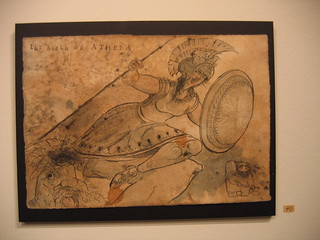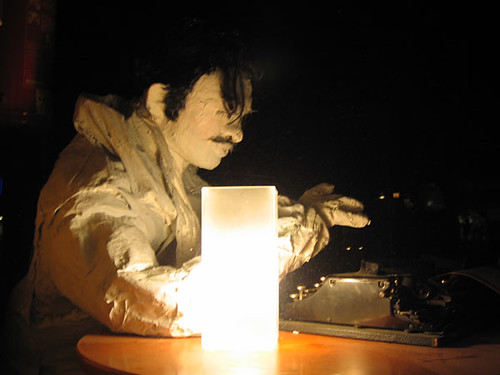by Joanne Paul
Dr Joanne Paul lectures in the History of Ideas at the New College of the Humanities in London. She blogs about history and feminism at Past the PhD. You can follow her on Twitter @Joanne_Paul_.
Ah, the tortured writer. It’s a classic image – hunched over a scribbled page, crumpled, discarded papers surround the desk, frail, undernourished, pale from lack of sunlight, at last this tortured writer, in the middle of the night, produces a flood of genius! This idea, odd and romantic as it may seem, does seem to persist amongst writers, even in universities, today. There is, what I like to call, a strange ‘academic asceticism’ that persists, that tells us to produce good work, we have to pull all-nighters, eat nothing but junk food (or nothing at all), caffeinate like crazy, lock ourselves in our rooms, in libraries, and barely sleep. It is only through restriction and gargantuan effort can we produce genius – like Athena birthed through the head of Zeus.
 I once had a friend, working on a dissertation, who locked herself in a bathroom for three days with candy and diet coke. I myself have worked 14+ hour days on my own dissertation, not leaving the house for days on end. Does this work? More or less… you might be able to get something written. And it might work for a short sprint, a single essay or dissertation, as long as you have nothing else on the go (or things like friends, loved ones, pets, house plants, etc). But for anyone who needs to make a life out of writing (and would like to have a life outside of writing), this will not work. The tortured writer, ‘academic asceticism’ all of these are myths – substantiated by the rare few who made it ‘work’ (while making vast and really unnecessary sacrifices – see above re: loved ones and house plants).
I once had a friend, working on a dissertation, who locked herself in a bathroom for three days with candy and diet coke. I myself have worked 14+ hour days on my own dissertation, not leaving the house for days on end. Does this work? More or less… you might be able to get something written. And it might work for a short sprint, a single essay or dissertation, as long as you have nothing else on the go (or things like friends, loved ones, pets, house plants, etc). But for anyone who needs to make a life out of writing (and would like to have a life outside of writing), this will not work. The tortured writer, ‘academic asceticism’ all of these are myths – substantiated by the rare few who made it ‘work’ (while making vast and really unnecessary sacrifices – see above re: loved ones and house plants).
There is a single, irrefutable, incontestable rule if you want to be a good writer (sorry to my fellow bloggers, I’m sure your rules are good too). This golden rule is: TAKE CARE OF YOURSELF. In other words… Eat. Drink. Be merry. This does not mean blow off your assignment and get sloshed at the pub. It does mean be fair to yourself, give yourself the breaks and space you need, and above all, respect your process.
Everyone’s process is different. For me, I spend (depending on the size of the project) days or weeks compiling notes and research, until I feel I’ve reached the limits of what I am investigating. Then, I sit down to write. And I realise it’s too big. There is too much information here to present in any kind of linear, progressive, rational fashion (more on the frustrating linearity of the academic essay, and ways to escape it, another time). No matter how I try, I can’t seem to produce genius (and we’re back to Athena again). It took several panic attacks, tantrums and ‘I’m just not smart enough’ sob sessions for me to release that this period is always temporary. Because after a day or two of this agony, I would give up on trying to produce brilliance, and I would produce something – I like to call it my ‘brain vomit’ stage. Once something is down, you can work with that. As a great writer once said ‘you can’t edit a blank page’.
 So I realised my process necessarily required time away from the project to reflect. Absorb. Marinate. Produce. Edit. My best ideas come when I step away. Take a long shower. Do some yoga. Go for a walk. Chat it out with a friend. And they definitely only come if I’ve had enough sleep/food/drink-that-is-not-caffeinated-or-alcoholic. Finding your process means listening more to yourself than to the pressures around you, telling you that you simply aren’t trying hard enough, and a real writer would stay up all night if they had to. A real writer is just a person who communicates their thoughts with eloquence, and that’s a lot harder if you’re falling asleep on a keyboard.
So I realised my process necessarily required time away from the project to reflect. Absorb. Marinate. Produce. Edit. My best ideas come when I step away. Take a long shower. Do some yoga. Go for a walk. Chat it out with a friend. And they definitely only come if I’ve had enough sleep/food/drink-that-is-not-caffeinated-or-alcoholic. Finding your process means listening more to yourself than to the pressures around you, telling you that you simply aren’t trying hard enough, and a real writer would stay up all night if they had to. A real writer is just a person who communicates their thoughts with eloquence, and that’s a lot harder if you’re falling asleep on a keyboard.

Thanks for sharing. I read many of your blog posts, cool, your blog is very good.
Thank you for your sharing. I am worried that I lack creative ideas. It is your article that makes me full of hope. Thank you. But, I have a question, can you help me?
Your article helped me a lot, is there any more related content? Thanks!
Your point of view caught my eye and was very interesting. Thanks. I have a question for you.
I don’t think the title of your article matches the content lol. Just kidding, mainly because I had some doubts after reading the article.
Thank you for your sharing. I am worried that I lack creative ideas. It is your article that makes me full of hope. Thank you. But, I have a question, can you help me?
Thank you for your sharing. I am worried that I lack creative ideas. It is your article that makes me full of hope. Thank you. But, I have a question, can you help me? https://www.binance.com/de-CH/register?ref=UM6SMJM3
Thanks for sharing. I read many of your blog posts, cool, your blog is very good.
Thanks for sharing. I read many of your blog posts, cool, your blog is very good. https://accounts.binance.com/fr-AF/register-person?ref=JHQQKNKN
Thank you for your sharing. I am worried that I lack creative ideas. It is your article that makes me full of hope. Thank you. But, I have a question, can you help me?